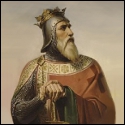|
1 Mythology
|
|
|
|

|
| # ? Apr 28, 2024 10:35 |
|
One M
|
|
|
|
I should probably have called this awhile ago, but Scenario Two is the winner (by a smaller-than-typical margin). I'm not going to start the next round just yet, because I think it's going to be a little different and I need a bit more time to decide. There is still, of course, the result of the secret mystery question to announce, which I will do without further delay. SUPER BATTLE ROUND RESULT: The battles were long and difficult, but eventually human ingenuity prevailed. Susano-o fell, mortally wounded, defeated by the humans he thought beneath him. Even gods, it seemed, were not immune to hubris. And yet the defeat of Susano-o was not the end. The Ainu had vanquished their foe and saved the world from divine domination... and yet many wondered why they needed to stop. They still had their machines - machines so powerful they had brought low the gods themselves. Why not seize Susano-o's plan for their own, bringing the world itself to its knees, and usher in a grand new era of technology? Japan fell within a year, China within three. Less than two decades later, the Ainu war machines rolled across the British Isles, completing the conquest of Eurasia. And yet not all were happy with the technocratic empire of the Ainu. Some of those who had once stood against Susano-o recognized that their compatriots had lost their way, losing sight of the very ideals of the resistance against Susano-o. They had stared too long into the abyss and become the foe they once hated. Many of the dissidents were purged, but a few worked in secret, developing new technologies and plotting the downfall of the empire. But direct war against the empire was impossible; their war machines were too powerful and too numerous to ever be defeated in a direct confrontation. A different sort of war was required. A war on linear time. The finest Ainu physicists and engineers managed to build the impossible: a machine capable of transporting its contents back in time. It was the ultimate weapon, capable of destroying the empire before it ever existed. The plan was simple enough: a small team of Ainu commandos would travel back to the dawn of the Koryak industrial revolution and ensure by whatever means necessary that it would never begin. Without the initial Koryak innovation, the Ainu war machines could never have been built in the first place. Another team would travel back to the Battle of Dan-no-ura, preventing the Kusanagi-no-Tsurugi from ever being cast into the sea and igniting Susano-o's rage. It was the perfect plan but for one flaw: it was quickly realized that no human being could survive the rigours of time travel. And so the resistance made its last desperate gamble. Stealing the Kusanagi-no-Tsurugi from its place as a trophy of the victory over Susano-o, they offered it as a gift to Amaterasu, its rightful owner, sister of Susano-o and greatest of all the gods. They begged the sun goddess to assist them in restoring balance to the world. Their prayers were answered, and Amaterasu agreed to assist them in their plan. Instead of the commando teams, it was the goddess herself who would go back in time, destroying the Koryak industrial revolution and preventing her brother from ever declaring war on humanity. And so it was that, after travelling centuries into the past, the goddess Amaterasu burst forth from the time machine and prevented the entire sordid episode from ever happening.
|
|
|
|
Bravo.
|
|
|
|
So that means Amaterasu will be the leader of an Ainu rebel state, RIGHT?
|
|
|
|
You show that freakin' linear time!
|
|
|
|
Viscardus posted:A war on linear time.  Well, that's certainly...something. Anybody remember when this was about the De Hautevilles' war for Sicily? Because I'm kinda scratching my head at how we got to this point, tonewise. That being said, I'm still interested to see where this goes.
|
|
|
|
Yvonmukluk posted:
I was hoping that someone else would come along and explain this, because I don't really want to have to break down my own jokes, but at this point I suppose I should just do it. It is a joke. I was making light of some of the silly (joking or otherwise) suggestions that have been given and trying to liven things up a little in case people were getting bored with the slow pace of everything. I deliberately ended it all with a literal deus ex machina just to drive home the point that it was not to be taken seriously (because even if you were to, the entire sequence of events is erased from existence anyway). I honestly would have thought this would have been somewhat obvious from how much I have insisted on keeping plausibility and a mostly-serious tone as important parts of the LP, but apparently not. That said, it will have an indirect effect on the scenario in that the Japanese archipelago will be influenced by YF's proposal (sans the impossible stuff) rather than Patter Song's. The next round of suggestions will start soon; like I said, it'll be a little bit different.
|
|
|
|
Viscardus posted:I was hoping that someone else would come along and explain this, because I don't really want to have to break down my own jokes, but at this point I suppose I should just do it. So you ARE going to include Ainu/Kamchatkan states? I personally think they would be good ideas to include just for the dual purpose of A): making Eastern/Northeastern Asia more interesting than the usual Japan/Korea/Manchu/Ming squabbles and B): preventing the Iberian settlement of Okhotsk and a large chunk of Eastern Russia. But I don't know how far along in development you are, anyway, so never mind.
|
|
|
|
Okay, that took a little longer than I expected, but I'm finally finished with the most stressful three weeks of my life. I can finally start working on the conversion again, and will hopefully have most of it done by the time the new expansion drops. As I said, the final round is going to work a little differently. I decided that the areas that were left (the Americas and the southern half of Africa) didn't offer a lot of possibilities for large-scale divergences in the vein of the ones we've had in Asia. So instead, I'm going to open this up to allow a larger number of smaller suggestions to vote on, covering The World. These can be in the Americas, Southern Africa, or even elsewhere, as long as it doesn't conflict with what's already been established. For example, you could propose something about Korea, which didn't really receive any changes in the East Asia scenario. Or you could do something like suggest a particular state that should exist in China or India, which don't have all of the states defined yet. Heck, I suppose you could even try to do something in the regions covered by the LP in CK2 if it's something you really think would mesh with what's happened, though that might be difficult to figure out. The idea here is that the changes would be smaller, though, probably only affecting one or two states. I'm looking for creative suggestions, preferably avoiding too much "these guys somehow conquered an enormous amount of territory" or "these guys are inexplicably technologically advanced". I'll probably pick around four, depending on how many suggestions I get, and then hold another vote (likely with more than just one making it into the scenario). Oh, and there is one more Special Bonus Round: Rhodes was part of the Serbian Kingdom of Nicaea before it fell to the Maidarids. In the game, it was conquered with the rest of the kingdom. But it seems unlikely that the Maidarids, a group of steppe nomads, could possibly have matched the naval power of the Catholic alliance. So it seems like Rhodes would not have fallen. So the question is this: who holds Rhodes? Most interesting (plausible) answer wins a prize that I haven't thought of yet. Maybe the prize is just having your idea in the scenario, I dunno. Viscardus fucked around with this message at 21:05 on May 6, 2014 |
|
|
|
For your special I suggest Rhodes controls Rhodes. After Nicaea fell they were forced to elect a General to take command of Rhodes' government and help fight back the Maidarids. Rhodes is now under the control of their military who enforces a strict no tolerance policy of outside religions and cultures. They do this in order to prevent Maidarid influence from tainting the state.
|
|
|
|
The Utopians! The men of Europe had heard rumors, yes, but the discovery of the mysterious island of Utopia, which had almost been named Bermuda before the inhabitants had spoken in a comprehensible language, shocked all the people of Christendom. How could it be? This lost colony, created by shipwrecked Roman and Greco-Egyptians in the 2nd century AD, had not been contacted since, and yet their inhabitants lived on, speaking a corrupted but nonetheless recognizable brand of Latin. The revival of the outward forms of the Roman Republic was shocking enough, but these sea people's adherence to the cult of Neptune, father of waters, proved bizarre and horrifying to the men of the Continent, over a millennium removed from the worship of the old gods. The most shocking thing of all is that the Utopians had not been quiet these past 1300 years, but, rather, had set sail to the west. Tiny Utopian colonies, founded in the last two hundred years, dotted the islands and landmasses of the great western continent, warring with and trading with and allying with and intermingling with the great Native empires within. The lumber of the New World had permitted the Utopians to build massive armadas, and dreams of the old motherland had never failed in Utopian minds. Horrified at the rise of Christianity and the destruction of Neptune's shrines in the Old World, the Utopians swore to remind Christendom who the true father of the waves was and remained.
|
|
|
|
With the destruction of the armies of Nicaea, the population of Rhodes saw their chance. The hated Latin nobles were butchered in the street, and the priest who led this rebellion proclaimed himself the new Ecumenical Patriarch. Rhodes has become a fortified and fanatic theocratic state, and the last bastion of Orthodoxy. The remaining Orthodox faithful are flocking to the island, preparing for a crusade of their own...
|
|
|
|
The barren wasteland of Rhodes no longer knows the touch of mortal feet, of human feet. None can truly say what happened there: Those who were close enough to see were blinded or sent mad. Its fortifications lie seemingly empty, with whispers of an ancient treasure of the crusaders or of the Romans tempting the unwary to try and seek it out. None return.
|
|
|
|
It's d'Hautevilles all the way down The Hautevilles are a large dynasty. They've governed great kingdoms, they have been Emperors, they have won crusades. They have spread all around the Mediterranean. They have ruled and served far and wide. Is it any surprise then that members of the dynasty might end up finding themselves far, far from Sicily, where the Great House first rose to prominence? Is it hard to imagine less prominent members of the prestigious dynasty serving as dignitaries and diplomats to faraway realms? Would you not believe me if I told you that they might lose their way, get stranded, or sever contact with their motherland, after the great Buddhist storm? What if I told you that courtly intrigue in faraway realms is just as - if not more! - complicated than that in the realms of Europe? That a man representing as great a family that far away might be rewarded by his hosts and granted titles? That over time might become an established member of the local nobility, and that him or his ancestors might rise to rule their realm? Such is the case in Ceylon, where an Hauteville noble once travelled to and settled on. Through the generations the Ceylonese Hautevilles adopted the faith and traditions of their hosts, and through whatever means became Kings of the island. Essentially the only effect of this is that Ceylon's ruling dynasty is the d'Hautevilles. The culture and religion remain uncharged. If there's a semi-generic "Hauteville" national ideas group (which isn't unlikely given how many loving Hauteville realms there are) Ceylon would receive that.
|
|
|
|
Viscardus posted:The World. In game, the Native Americans should generally be larger (maybe add something like 2-3 province to most natives), while still in the same techgroup and get one or two additional conquest missions against other Native Americans to encourage blobbing among them. As a result hopefully a few strong native states will emerge that can give the European invaders a run for their money when it comes to North American domination. (There should be no European colonies or Vinlanders in America at the game start or anything like that) Viscardus posted:Oh, and there is one more Special Bonus Round: Since the end of the war the island has turned into a safe haven for Christian pirates which terrorize the Anatolian and Levantine coasts. It's government is an anarchic mess, where the formerly highest ranking leaders of the armies and navies that remained have formed a council that supposedly controls foreign and domestic affairs, but the jumbled mess of nationalities and allegiances make ruling the island a nightmare. In-game it should be a republic that elects its leader for life but can't engage in RMs. Its ideas should be somewhat close to the Berber states, with +Coring Costs and naval improvements. Bonus points if you copy over the pirate events from EU3 Magna Mundi 
|
|
|
|
Rhodes, and all cities, castles, places and island territories thereof, were granted, in feudal perpetuity, to the Very Reverend Grand Master of the Poor Fellow-Soldiers of Christ and of the Temple of Solomon under the sole payment of a falcon; which every year, on the Feast of All Saints, shall be presented by the person or persons duly authorized for that purpose, into the hands of the Viceroy or President, in sign and recognition of feudal tenure. Control of Rhodes ceded to the Knights Templar to protect it from the heathen menace and provide a haven for refugees from the Holy Land. Start allied with Serbia/Nicaea/Genoa. Someone had to make the obvious joke! i81icu812 fucked around with this message at 03:06 on May 7, 2014 |
|
|
|
It's a cool idea, but what really screwed up the tribes wasn't the fact that they were suffering diseases that could kill half the population, but that they were being exposed to so many of them all at once; smallpox, cholera, measles, influenza, malaria and bubonic and pneumonic plague. Iceland was just as isolated from those pandemics as the tribes were.
|
|
|
|
Viscardus posted:Oh, and there is one more Special Bonus Round: The steppe nomads? I mean, if not for some freak weather...
|
|
|
|
Rhodes, to this day, is ruled over by the Serbian Emperors of Nicaea. While the First and Second Romes have fallen, the Third Rome stands, unbroken, an island of calm and Serbian clay in a sea of chaos.
|
|
|
|
the JJ posted:The steppe nomads? I didn't say that they couldn't build ships, just that they couldn't match a Catholic alliance that included several Mediterranean powers, especially in such a short period of time. The invasion of Japan isn't really comparable. Once we get into EU4 and the Maidarids start eyeing Constantinople, on the other hand... Anyway, it's not really a big deal either way, I just thought it would be fun to do something more interesting with Rhodes that make it part of the (already very large) Maidarid Empire.
|
|
|
|
sheep-dodger posted:Bonus points if you copy over the pirate events from EU3 Magna Mundi
|
|
|
|
Africa what is known as the Dark Continent to the Europeans has been the battleground for two major power at the southern point of the continent. Those fleeing the fall of the Orthodox Byzantine Empire found refuge in the Kingdom of Kongo where the King, fascinated by tales of Christ and the Roman Empire, converts to Orthodoxy and proclaims his kingdom as a successor to Rome and seeks to proclaim himself the new Emperor of Rome, and has expanded northwards and has threatened the Kingdom of Ghana. At the southernmost tip of Africa the people of the Native faith of beset by both the Cross and the Crescent have been unified by Shaka Zulu, who has proclaim himself ruler of the Zulu Empire. The Zulu Empire has , with it's highly disciplined soldiers, have conquered far enough north to threaten the Kingdom of Abyssinia and the Rassid Caliphate. However, Zulu and Kongo border tensions have been rising and may soon break out into war. (Basically Kongo is Orthodox and has pretty much the entire West African coastline,minus Ghana and it's neighbors, and has the Roman Empire National Ideas. Zulu has South Africa and East Africa and is the Sahelian faith(West African Pagan). However it's northernmost provences are still Sunni. It's National Ideas consist of Quality for it's troops and opposed to Kongo's Roman Quantity ones. Both have an eastern tech group for increased survival chance against the Europeans. Finally, the border provences of Kongo and Zulu have cores or claims for the other nation.)
|
|
|
|
I want Steppe Nomads in America. I want to see Nomads fighting Natives, on the wide open plains. Intermingling, fighting, feuding and changing. Maybe it's a tribe sent by the Yuan who go rogue when they realize this place is a hell of a lot bigger and further away than they thought. Maybe it was an expedition, maybe they were exiled. But it means that when the big-nosed hair-monsters come blundering in, they find an independent Khanate battling an alliance of tribes that have adopted their tactics and methods of war alongside those that have banded together despite their differences to create a new identity, with none unprepared for the late-comers. Maybe the warring factions want an alliance to beat up the other. Maybe a savvy ghost can play the two biggest against each other then reap the prize from the slain while grabbing the small independents. Whatever it would be, it would at least be different. Just an idea because honestly, Viking-Indians, Super-Aztecs and the old normal+1 just seem sorta played out and I don't remember anyone trying this out before and in action it wouldn't be super complex. So you'd have an West-Coast Khanate, with the other major faction being natives that had allied and grown stronger to resist them and some who had moved up to the Nomad tech group as well. Some missions to gently caress over each other? Better provinces too? Eh. Edit: wait gently caress id completely forgotten the earlier stuff y'all thought up. that's what i get for 3 am posting well, whatever of that isn't hugely conflicting would be cool. a small West-Coast Khanate maybe? Ghetto Prince posted:Iceland was just as isolated from those pandemics as the tribes were. Deceitful Penguin fucked around with this message at 03:38 on May 7, 2014 |
|
|
|
Ghetto Prince posted:It's a cool idea, but what really screwed up the tribes wasn't the fact that they were suffering diseases that could kill half the population, but that they were being exposed to so many of them all at once; smallpox, cholera, measles, influenza, malaria and bubonic and pneumonic plague. I do understand that, my aim is mostly to have the natives have better resistance against the diseases brought from Europe and all the other options I could think of (traditional colonizers get there, make contact and turn around and leave again without ever telling anybody, magic or NANOMACHINES Son!) seem way less plausible, if someone can think of a better idea how to spin it I'm all for it.
|
|
|
|
Madagascar and Aotearoa (native New Zealand) independent countries. I have these two already in a mod of mine, so you can just borrow the work if you want.
|
|
|
|
I'd still like to see a St Thomas Christian state down in India.
|
|
|
|
Wikipedia article History of Basque Whaling posted:In his History of Brittany (1582), the French jurist and historian Bertrand d'Argentré (1519-1590) was the first to make the dubious claim that the Basques, Bretons, and Normans were the first to reach the New World "before any other people".[2][20] The Bordeaux jurist Etienne de Cleirac (1647) made a similar claim, stating that the French Basques, in pursuing whales across the North Atlantic, discovered North America a century before Columbus.[21] The Belgian cetologist Pierre-Joseph van Beneden (1878, 1892) repeated such assertions by saying that the Basques, in the year 1372, found the number of whales to increase on approach of the Newfoundland Banks.[2][3] Stick Basque new world techgroup (but higher tech and with a higher chance to westernize) states on Newfoundland, the Azores, and the Lesser Antilles. Possibly start off the actual natives with a plaguestruck modifier that comes off just in time for other Europeans to show up. Not really any more plausible than any other "yeah people had secretly found the new world and not told anyone" but at least it probably hasn't been done before  . .
|
|
|
|
reignonyourparade posted:Stick Basque new world techgroup (but higher tech and with a higher chance to westernize) states on Newfoundland, the Azores, and the Lesser Antilles. Possibly start off the actual natives with a plaguestruck modifier that comes off just in time for other Europeans to show up. Not really any more plausible than any other "yeah people had secretly found the new world and not told anyone" but at least it probably hasn't been done before I like the cut of your gib good sir
|
|
|
|
Maya Eternal In 800 AD, urban centers across Mesoamerica went into a sudden decline and collapse. Teotihuacan was ransacked, Palenque abandoned, Tikal's central administration disappeared without explanation. Between 400 and 450 AD, the population of Copan was six-hundred people. This rose to a peak of twenty-eight thousand between 750 and 800 AD - larger than London or Paris at the time. Population then began steady decline. By 900 AD, the population had fallen to fifteen thousand, and by 1200 AD the population was again less than 1000 in Copán. There have been server all theories as to why this collapse occurred. One of the most prominent is that Mayan urban centers became too population dense and we're unable to cope with drought. River basins dried up. Trees disappeared due to unrestricted end deforestation policies. The entire region experienced ecological collapse. My suggestion is simple. Rather than build on top of themselves, the city-states expanded outward, covering a larger expanse of territory. QuoProQuid fucked around with this message at 15:42 on May 7, 2014 |
|
|
|
I've been pretty fascinated with OTL pre-Colombian New World contact scenarios lately. I think with the presence of the Icelandic Republic in the Atlantic and the Ainu Trading States in Northern Japan and Kamchatka, there are two obvious possibilities for interesting alt-History. These proposals are meant to be mutually exclusive, to keep things from getting too wacky: The Ainu and the Haida Nation The Ainu traders of North East Asia have long known of a distant land across the frozen, stormy seas of the North. In the early 14th century, a number of trade posts were founded on islands in the Bering Sea and on the coast of OTL British Columbia. Abandoned a century later due to poor governance and limited economic return, this early contact massively changed the course of history for the peoples who were savvy enough to take advantage of the goods offered by the Ainu. Already a powerful people, the Haida took full advantage of the superior sailing technology and weaponry these traders from the West offered, as well as the strange animals they had brought with them (Horses). What conquest could not win, diplomacy and marriage did, uniting with the Chinook and Salish of the Cascades. Even with the departure of the Ainu, the Haida have become a powerful force, with territory stretching from Alaska to Northern California. TL;DR - the Ainu pulled a Vinland on the Haida, bringing them better boats, steel, horses and germ resistance. Effect - The Haida Control the West Coast from Alaska down to Northern California. They start in the High American Tech group and have a custom government similar to a Noble Republic. The Norse and the Abenaki In this scenario, the Norse colonization of Vinland was significantly more successful. Further Norse exploration of the North American continent brought them in contact with the Algonquin speaking peoples of the North East, with whom they developed a cautious rapport. When the Vinland colony was abandoned due to a shift in the North Atlantic's climate, the Norse Settlers fled south to Algonquin lands and brought with them cattle, steel and two European religions. Adopted by the Abenaki, the technology introduced by the Norse settlers helped the Abenaki conquer much of the OTL Quebec and New England. A syncretic Norse-Native paganism worshiping a Christ-like Baldr figure has also developed. TL;DR - Vinland was more successful, resulting in Norse migration inland after the colony's failure. Effect - An Algonquin speaking Abenaki state exists in OTL Quebec and New England. They start in the High American Tech group. They have a custom religion based on Norse Paganism, Christianity and Native American Spiritualism. Fox Ironic fucked around with this message at 07:25 on May 8, 2014 |
|
|
|
Fox Ironic posted:I've been pretty fascinated with OTL pre-Colombian New World contact scenarios lately. I think with the presence of the Icelandic Republic in the Atlantic and the Ainu Trading States in Northern Japan and Kamchatka, there are two obvious possibilities for interesting alt-History. These proposals are meant to be mutually exclusive, to keep things from getting too wacky: All of my yes!
|
|
|
|
The Might of the Pawnee Deep in the heartland of the Great Plains, an ambitious young man has unlocked a secret that has eluded the various plains tribes for eons: Buffalo domestication. Riding on these mighty steeds of war, he has dedicated his life to unifying the plains tribes under his rule. After that, who knows? Perhaps he shall set his sights beyond the Great Grass Sea and fulfill his manifest destiny.... Effects: An America more densely populated by native nations, and in the center of it a small, but noticeably blobby Pawnee. They start a military tech ahead of the other nations, which unlocks Buffalo Warriors, a cavalry unit on par with or better than what the Nomads start with. The idea is to have the Pawnee pull a Mongol style conquest of North America, which should clash with the beginnings of colonialism.
|
|
|
|
QuoProQuid posted:Maya Eternal In 800 AD, urban centers across Mesoamerica went into a sudden decline and collapse. Teotihuacan was ransacked, Palenque abandoned, Tikal's central administration disappeared without explanation. Between 400 and 450 AD, the population of Copan was six-hundred people. This rose to a peak of twenty-eight thousand between 750 and 800 AD - larger than London or Paris at the time. Population then began steady decline. By 900 AD, the population had fallen to fifteen thousand, and by 1200 AD the population was again less than 1000 in Copán. Non-collapsed Maya. I love this already.
|
|
|
|
ThatBasqueGuy posted:The Might of the Pawnee How to train your Buffalo?
|
|
|
|
ThatBasqueGuy posted:The Might of the Pawnee Perchance are they lead by the noble Ronald of House Swanson?
|
|
|
|
Fox Ironic posted:The Norse and the Abenaki Please yes.
|
|
|
|
The Atlantic Crusade When the Latins claimed the ancient lands of the Greeks and declared themselves successors of Rome in the middle of the 13th century, the surviving Varangian Guard - the Basilessa's elite Viking mercenary bodyguard-cum-private army - withdrew in shame from Constantinople, their storied legacy at an end. By the dawn of the 14th century, the adventurous sons of Scandinavia had turned their backs on Europe, striking out for new realms in search of the wealth and glory once brought to them by the last true Roman Empire. Around this same time, the French-born Cardinal of Monreale, a famously eloquent speaker, was forced to flee the Vatican in disgrace after the Pope declared him a heretic and excommunicated him in retribution for a series of highly inflammatory treatises he wrote decrying the Church's excesses. By all accounts driven to paranoid madness by his excommunication and the Church's repeated attempts to apprehend him in italy and France, the former Cardinal fled as far beyond the reach of the Papacy as possible, eventually winding up in Iceland in 1405. For a brief period, driven by increasing demand for lumber on the now-deforested Norse island, the meager settlements in Vinland - which had stumbled along for some three hundred years as little more than intermittent logging camps - blossomed, and the foundations were laid for more permanent settlement. While more-or-less amicable relations had previously been possible with the natives of the sparsely-populated northern wastes, the increasing Norse presence in Vinland began to strain relations with the native Inuit peoples. The burned ruins of Erikson's Vinland were discovered in 1402, sparking anger back in Reykjavik that the Cardinal quickly fanned into a flame. Claiming holy visions of everything from monasteries packed with riches to the hidden valley of the Garden of Eden hidden in the wastes and playing alternately off greed, religious interest and an appeal to vengeance, by 1408 the Cardinal had fomented enough popular support to launch a minor invasion with the goal of establishing a fortress from which to launch further expeditions in pursuit of Vinland's now-legendary (and entirely fictitious) wealth, and perhaps sparking a second Viking Age against the native settlements in Markland. The flotilla eventually made landfall far up a major fjord, on an island beneath a mountain in 1409. The mountain was officially christened Kungliga Berg - Royal Mountain - as a somewhat tongue-in-cheek joke on the Cardinal's former title, but the man himself referred to it in his limited correspondence and on their few crude maps in his native French, and when word of it eventually reached Sweden sometime in the 1450s, it was known only as Montreal. The new territory, isolated from the Inuit who had plagued the previous Vinland settlements, nevertheless almost immediately came into conflict with the local Algonquin tribes, a conflict that soon turned into a minor war between the handful of settlers (with the advantage of several large ships at their disposal) against the much more numerous natives that eventually ended with the formal purchase of the islands and a peace treaty in exchange for several metal pots and every surviving horse. While the town itself would languish in obscurity for quite some time and the historical events surrounding its formation would remain only of local interest well into the modern age, the impact of that few dozen horses on the history of the Americas cannot be overstated. By the 1450s, the horse had become an integral part of the native cultures in the great Markland forests; by 1550, they were ubiquitous across the continent. end result: Montreal starts as the capital of a fairly weak, low-population Norse-culture Catholic-heresy OPM with a level 1 fort; Amerindian tech group unlocks cavalry units somewhere around mil tech 2-3; Algonquin-culture nations get an extra province and some extra starting monarch points; bump up the ferocity and aggressiveness of the unclaimed Inuit territories in northern and eastern Canada a lot. bonus suggestion: Rhodes is the holdout of the last surviving minor branches of House Doukas, the last emperors of Constantinople before the Norman invasion. They pledged fealty to Serbia-Nicaea following the Crusade in exchange for protection from further Latin Empire incursion, but became de facto independent during the Maidarid invasion along with their estates in Cyprus and Naxos and, as the Latin Empire wanes in power, have recently styled themselves Byzantine Emperors once again, though their Empire consists entirely of a handful of Greek islands and the title is almost entirely ceremonial in practical terms.
|
|
|
|
The Samurai Statlets in North America In the aftermath of the Genpei Wars. A scion of the losing Taira clan decided to exile himself and the rest of his clan towards the East. Centuries later, their efforts ended with Japanese contact of the north american west coast and trade fluorished between the two continents. Heirs of Naylamp With their golden age long gone, and pressured by all sides, the Chime leaders in south america follow the visions of a shaman who claims "They must return to the lands of Naylamp". After some tragedies a vessel manages to make contact with polynesian islanders. A trade colony is formed but comes into violent contact with a maori-like people. After some bloody clashes an uneasy truce is formed and, in relative isolation, a sincretic culture emerges over the years. So yeah, i'd like to see more contact between Asia and America
|
|
|
|

|
| # ? Apr 28, 2024 10:35 |
|
I kind of think most of you are ignoring the intent of Viscardus' instructions. He asked for small changes not massive new empires or weird pre-Columbian contact scenarios. I have a few suggestions myself, but I'm going to keep them simple and let other people fill in some of the details. Tibet Ascendant: The rise of Maidar Khan has fundamentally changed the nature Buddhism in Central Asia and nowhere has the change been more pronounced than Tibet. Over the past century, the lamas have shifted from an inward focus on contemplation and personal enlightenment to an outward focus as missionaries and guardians of the faithful. Several militant monastic orders have sprung up and Tibetan armies have come down from the plateau to "pacify" heathens from the Hindu Kush to Bengal and far into the tablelands of Central Asia. The transition from isolated mountain theocracy to regional power has done much to boost Tibet's wealth and prestige, but has diminished the authority of the Dalai Lama and the government in Lhasa. It has also angered many of their neighbors (even some of the Buddhist ones) who have begun to eye the lands and wealth of lamas with naked greed. (Tibetan Buddhism has spread much farther than in OTL, but only the plateau itself is part of "Tibet" proper. The rest of their empire consists of two or three vassal states who will either be integrated, conquered by someone else, or become fully independent over time.) The King on the Niger: The Sicilian conquest of Tripolitania has had profound effects on trade in Central and West Africa. Rather than being exclusively reliant on Muslim traders for access to Mediterranean markets, the peoples of the Sahel had access to new ideas and new markets and a great flowering of culture took place. No where was more transformed than the Kingdom of Kanem once a great empire, political upheavals and conflicts between Islam and traditional practices had left the country a diminished power when Christian traders and missionaries first came there. Things changed quickly after that however, new economic opportunities refilled the country's coffers and adoption of the Catholic rite brought Kanem's rulers into Christian sphere while providing a pretext for centralizing efforts and a renewed expansionism. The economic boom and the introduction of new ideas and technologies by European scholars and military advisers has allowed the Kanem to extend their authority beyond their homelands around Lake Chad to areas as far to the South and West as the Niger river valley and the Gulf of Guinea. The Emperor of Kanem has declared his intentions to rule the entire Niger basin, but the native kingdoms of Nri, Oyo and Kumbee-Tenga continue to resist his hegemony and the neighboring empires of Ghana and Kongo, Kanem's main rivals for the Trans-Saharan trade would both dearly like to see them taken down a peg. (In modern terms, the Kanem control Chad and Niger as well as the eastern portion of Nigeria, but the rest of Nigeria isheld by small buffer states being propped up by Ghana. Meanwhile, their progress into Cameroon and Central Africa have been halted by Kongo and their satellites, but it's unclear how long that situation can last in light of the Kanem's superior military.)
|
|
|



























